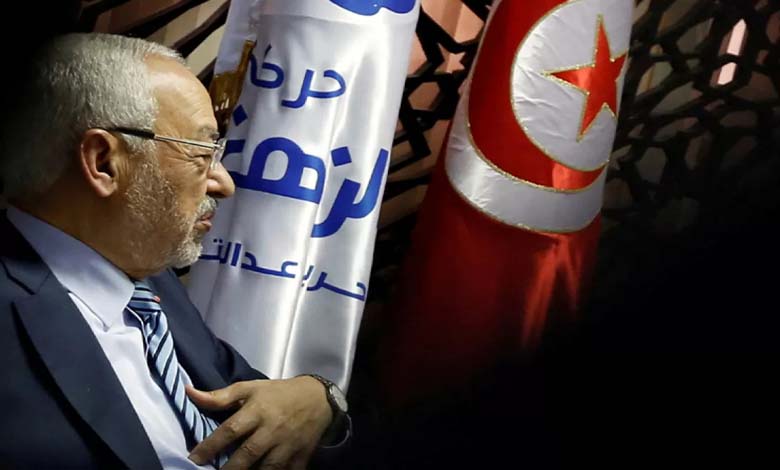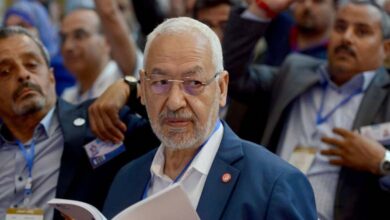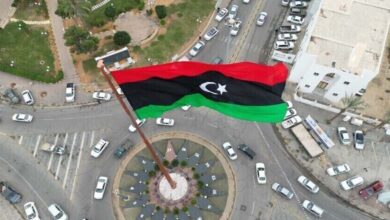Conspiracy 2: Tunisian Judiciary Faces Deepest Muslim Brotherhood Plot to Infiltrate the State

The Muslim Brotherhood in Tunisia has intensified efforts to disrupt the course of justice just hours before the trial of its leader, Rached Ghannouchi, begins in the case known in the media as “Conspiracy Against State Security 2.”
-
Tunisian Judiciary Extends Detention of Islamist Lajmi Lourimi, Successor to Ghannouchi
-
Tunisia: Rached Ghannouchi refuses to appear before the judiciary in a money laundering case
In an attempt to derail the judicial process, the National Salvation Front — the political front for the Brotherhood — called on its supporters, along with political and civil forces, to “intensify pressure to stop these trials and restore an environment that guarantees fair trial conditions for all,” as stated in their appeal.
Today, Tuesday, 23 defendants, including Rached Ghannouchi, are scheduled to appear before the Counter-Terrorism Chamber at the Tunis First Instance Court, to face charges of forming a terrorist alliance and conspiring against the internal security of the state.
-
Including Ghannouchi: 21 Muslim Brotherhood Members Referred to Terrorism Court for “Coup Plot”
-
Ghannouchi referred for investigation in the case of the Muslim Brotherhood’s secret apparatus: Details
The case dates back to June 2023, when the investigation bureau under the Counter-Terrorism Judicial Pole opened a new probe into a conspiracy against state security, targeting what was described as a criminal coalition comprising several prominent figures, including former Prime Minister Youssef Chahed, former Director-General of National Security Kamal El-Kaïzani, former Intelligence Director, along with Rached Ghannouchi and his son Moaz.
The investigations extended to high-ranking Brotherhood leaders, including Ali Larayedh and Lotfi Zitoun, as well as Nadia Akacha — the former chief of the presidential cabinet and one of the most prominent fugitives abroad — Mahrez Zouari, former Interior Ministry official, Abdelkarim Laabidi, and Mustapha Khedhr, both implicated in the 2013 assassinations of leftist leaders Chokri Belaïd and Mohamed Brahmi.
-
Tunisia’s Brotherhood: Court Upholds Ghannouchi’s One-Year Prison Sentence for “Tyrants”
-
Tunisian judiciary upholds prison sentence for Ghannouchi and his son-in-law
Among the accused is also Kamal El-Badoui, a retired military officer and former Ennahda leader, who belonged to the so-called “Baraket Sahel” group. He is also accused in the “secret apparatus” case of the movement and was reportedly in charge of personal security at Rached Ghannouchi’s residence.
Details of the Brotherhood’s Plot
Tunisian activist and political analyst Nabil Ghawari stated that Tuesday’s session is the first hearing in what has become known as “Conspiracy Against State Security 2.”
He noted that the charges are based on conclusive evidence, starting with a series of intercepted calls and communications that included sensitive leaks regarding the presidential palace. These leaks, originally from Nadia Akacha during her tenure as head of the presidential cabinet, were passed to Kamal El-Badoui through politician Rayan Hamzaoui. The plan was reportedly aimed at eliminating President Kais Saied and plotting his assassination.
-
The Tunisian Muslim Brotherhood and the Assassination of Belaïd… A Fragmented Narrative
-
Tunisia in 2025… Year of « Security Vigilance » and Resolution against the Muslim Brotherhood
Ghawari explained that Brotherhood leader Rached Ghannouchi and his son Moaz are behind this plot. He added that the list of 23 accused includes figures who held high-ranking positions within the state apparatus, such as Nadia Akacha, who served as minister and chief of the presidential cabinet and was a top advisor to Kais Saied in 2020 and 2021, along with former Prime Minister Youssef Chahed (2017–2020) and several senior security officials from the Interior Ministry.
He emphasized that the danger of the case lies in the seniority and sensitive roles of the individuals involved, which reveals the complexity and depth of the Brotherhood’s plot to infiltrate the state.
Earlier, Tunisian authorities announced they had thwarted a plot to overthrow the regime by infiltrating the presidential palace with the help of Nadia Akacha, who ran President Saied’s cabinet since he took office at Carthage Palace.
-
How Kais Saied Ended the Control of the “Muslim Brotherhood” Over Tunisia and Its Institutions: A Report Explains
-
Tunisia’s Brotherhood Still Trying to Escalate the Situation… What Have They Done?
At the time, the Ministry of Interior stated that its security services had intercepted confirmed information about serious threats to President Kais Saied’s physical safety, orchestrated by both internal and external parties seeking to create chaos and destabilize the country.
A Renewed History of Conspiracy
This new case continues the judicial track that began with the first “Conspiracy Against State Security” case, which dates back to February 14, 2023, when Tunisian authorities arrested several Brotherhood leaders and their allies — including judges and influential businessmen — on suspicion of plotting to overthrow the regime.
-
Tunisia Ends the Era of the Muslim Brotherhood: Kais Saied Wins Presidential Election in the First Round
-
Hours After His Release… Tunisian Authorities Re-Arrest Muslim Brotherhood Leader
Investigations revealed that the Brotherhood had selected political figure Khemaïs Jhinaoui as a potential successor to President Kais Saied if their plan succeeded, confirming that he was a key intermediary in the plot.
On April 19, the Tunisian judiciary handed down prison sentences ranging from 13 to 66 years to several Brotherhood leaders and their political partners after convicting them of conspiracy against state security in the case known in the media as “The Conspiracy.”












